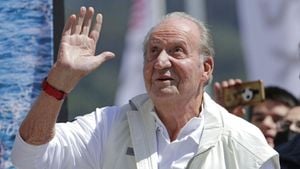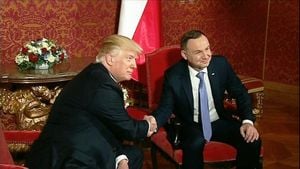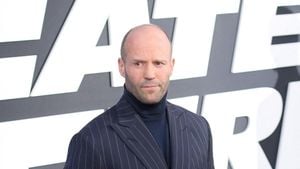International peace negotiations concerning the Ukraine conflict have gained momentum, marked by significant discussions among global leaders. Recently, UK Prime Minister Sir Keir Starmer emphasized the importance of ensuring Ukraine's sovereignty during discussions with US President Donald Trump, set to take place next week. Both leaders articulated the pressing need for Ukraine to remain central to any negotiations aimed at resolving the war instigated by Russia.
Starmer, during his call to Ukrainian President Volodymyr Zelensky, reiterated the UK’s unwavering support for Kyiv, described as 'ironclad.' His statement came shortly after recent shifts in US foreign policy, sparking concerns among European allies about potential sidelining of Ukraine in peace talks. Starmer asserted, 'Ukraine must be at the heart of any negotiations to end the war' and committed to advocating for 'a just and enduring peace.'
The UK Prime Minister and Zelensky held their second phone discussion within four days, indicating the urgency of the matter as Sir Keir prepares for his visit to Washington, D.C. next week. Their conversations initiated weeks marked by extensive discussions among European leaders, collectively scrambling to navigate the unexpected thawing of US-Russian relations.
Starmer’s assertion of Ukraine’s pivotal role echoes sentiments from protests held throughout London, where demonstrators expressed their outrage against Trump’s remarks about Ukraine. Thousands marched to the Russian embassy, responding to Trump’s comments criticizing Zelensky as lacking influence and describing him as effectively dispensable at the negotiating table. Margaret Owen, 93, participating in the protests, condemned the parallels between current events and historical appeasement, likening Trump’s tactics to pacifying Hitler before World War II.
Meanwhile, Trump has branded Zelensky as ‘a dictator’ who initiated the war, dismissing the historical backdrop of Russia’s invasion of Ukraine. Zelensky, for his part, has urged leaders to recognize the dangerous misinformation clouding perceptions of the conflict, emphasizing the need to protect his nation’s interests.
European leaders remain concerned about the shift toward negotiations without Ukrainian involvement. Amid fears of sidelining, the first round of peace talks held recently between US and Russian officials highlighted Ukraine's absence, triggering discontent among European allies ready to back Zelensky’s government. These discussions took place on February 25 during the second set of negotiations hosted again by Saudi Arabia, raising alarm bells about the direction of the negotiations, especially as Zelensky retained his insistence on Ukrainian involvement.
US Secretary of State Marco Rubio, who attended the negotiations, acknowledged the need for increased cooperation but also cautioned against overreliance on the outcomes of discussions sidelining Ukraine. 'Both parties expressed broad agreement moving forward, but more work is required,' he noted, guiding attention away from hasty conclusions.
Trump’s administration has signaled potential plans for bilateral talks between him and Russian President Vladimir Putin, which would seek to normalize relations post-conflict. Russian Deputy Foreign Minister Sergey Ryabkov has indicated these meetings could focus on broader global issues, underscoring the risky potential for leaving Ukraine’s voice out of pivotal discussions shaping their future.
Within Ukraine, unease permeates as Trump proposes agreements demanding access to Ukraine’s rare earth mineral resources, raising questions about the fairness of any trading arrangements between the nations as part of military aid. Reports indicate Zelensky’s hesitance to enter such discussions, reflecting broader sentiments within the country against perceived exploitation.
‘What kind of partnership is this?’ remarked one source close to Zelensky. The rhetoric has stressed security guarantees and equitable treatment as non-negotiable conditions for Ukraine during discussions influencing its natural resources. Simultaneously, accusations arise against Trump, whose stark divergence of tones toward Zelensky starkly contrasts with US officials’ praise, highlighting the strains of diplomatic relations amid the conflict.
Analyzing future repercussions reveals tech and strategy decisions evolve significantly depending on the conclusions drawn from this increasingly complex situation. International sentiment now calls for peace but not at the expense of compromises detrimental to Ukrainian sovereignty.
Spain's Prime Minister, Pedro Sánchez, reinforced the necessity of inclusive peace discussions, stating, 'Any just and lasting peace requires Ukrainian and European participation,' reiteration of the urgent need to include voices like Zelensky's to secure lasting peace.
Moving forward, global stakeholders await decisive actions and responses from leaders involved, recognizing the delicate balance of securing peace without undermining the rights or autonomy of those most affected by the war. The international community watches closely, reflecting their heightened commitment to empower Ukraine's rightful place at the negotiation table as the path forward is carefully forged.



